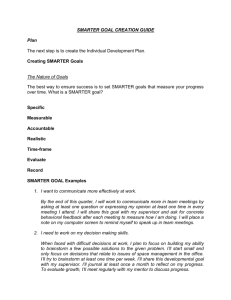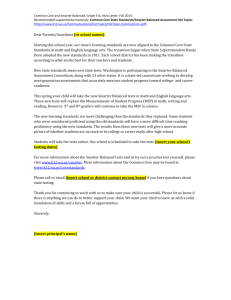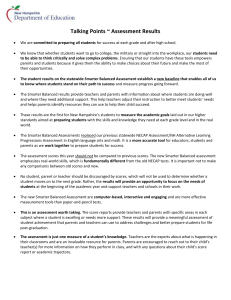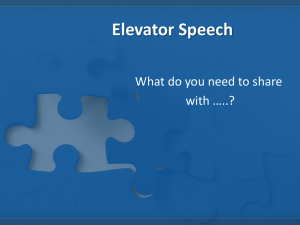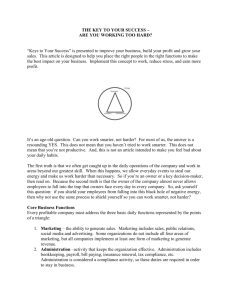Is Technology making us smarter
advertisement
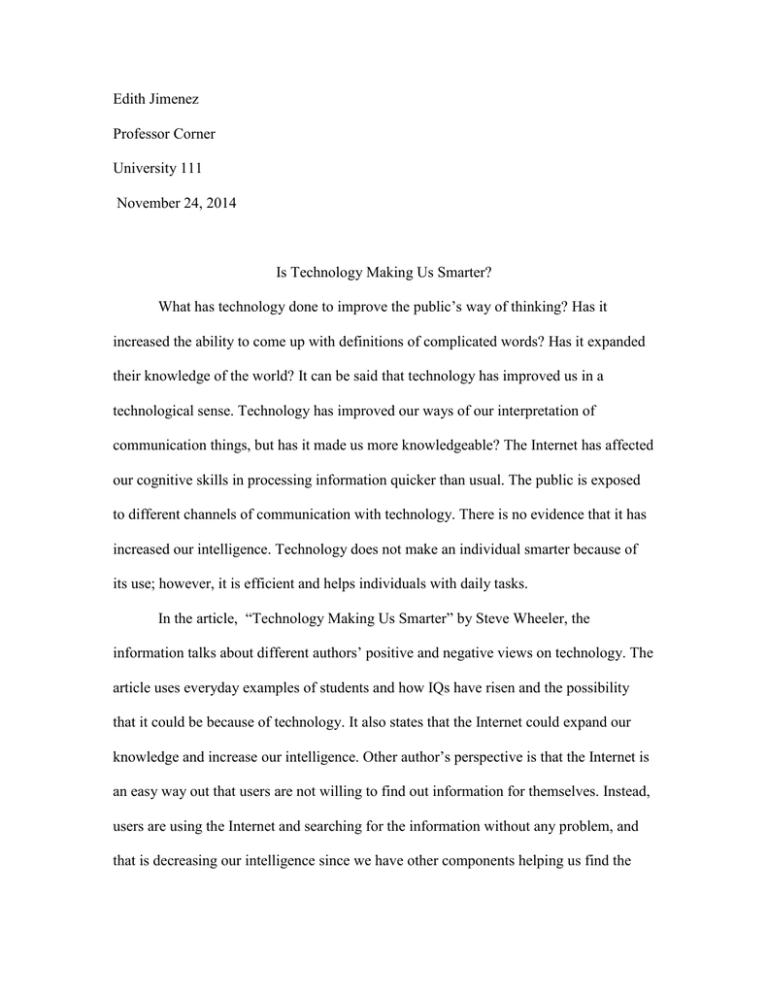
Edith Jimenez Professor Corner University 111 November 24, 2014 Is Technology Making Us Smarter? What has technology done to improve the public’s way of thinking? Has it increased the ability to come up with definitions of complicated words? Has it expanded their knowledge of the world? It can be said that technology has improved us in a technological sense. Technology has improved our ways of our interpretation of communication things, but has it made us more knowledgeable? The Internet has affected our cognitive skills in processing information quicker than usual. The public is exposed to different channels of communication with technology. There is no evidence that it has increased our intelligence. Technology does not make an individual smarter because of its use; however, it is efficient and helps individuals with daily tasks. In the article, “Technology Making Us Smarter” by Steve Wheeler, the information talks about different authors’ positive and negative views on technology. The article uses everyday examples of students and how IQs have risen and the possibility that it could be because of technology. It also states that the Internet could expand our knowledge and increase our intelligence. Other author’s perspective is that the Internet is an easy way out that users are not willing to find out information for themselves. Instead, users are using the Internet and searching for the information without any problem, and that is decreasing our intelligence since we have other components helping us find the answers or facts in an easier way. Keen, one of the authors mentioned, stated that with the increase of using the Internet we “undermined the authority of academics” (Wheeler 427). People depend on technology to escape the hard and crucial task of finding information on their own. In Kurzweil’s point of view “technology and the human mind are symbiotic, reliant upon each other for their mutual development” (Wheeler 427). Kurzweil is trying to explain that in his vision of the future, he expects humans to be smarter than how humans are today. He sees this because more opportunities to connect, create, and fine knowledge will come up for humanity. There are a few key points on why technology is helpful and sometimes better than traditional ways of learning academic things. Miller states, “that for all the critical thinking skills students may acquire during college, very little of the factual material they encounter actually survives in long-term memory”(16). In a research done by cognitive psychologist Harry Bahrick he mentioned that students tend to forget course materials immediately and they keep on forgetting materials in upcoming years. Dede acknowledged that, “students who attend schools today are different from those of previous years because using technology is non-school settings is altering their “learning styles, strength and preferences” (Shapley 299) First students can learn better through online quizzes or assignments, because they do not need to be rushed in class to finish an assignment. With quizzes being online students are able to do them on their own time and are able to find out the answers without having to worry about running out of time. Secondly, teachers require and use clickers during class so that students could earn participation points. It is a good way to answer questions with out letting people know each other’s answers and feel ashamed if the answer is incorrect. We are also able to let the Internet be another source to find information needed for school assignments or upcoming projects. The use of the Internet for sources on upcoming projects or assignments have made it efficient for students and adults to find resources without the trouble of having to go and look in a library and instead, have it directly in front of them. It’s difficult to avoid using technology because it’s all around us. Technology is depended for emails and searching for locations or directions. It also helps to communicate with the rest of the world, like with social networks. There are different chains of communicating with people but the two most commonly used in this generation are social networks and emails. McLuhan in the 1960 pointed out, “media are not just passive channels of information. They supply the stuff of thought, but they also shape the process of thought”(Carr 101). Technology and the Internet help every individual with networking, letting people know about upcoming business ideas. Everything is being controlled by something that is technology based these days. When students need to ask a professor about a question the quickest way is through technology. Humans have developed a friendship with technology. These days its common to see someone on a social network, checking email, or watching reruns of the individuals favorite shows on a computer. As stated before, technology is all around in everyone’s every day lives. It’s a resource not just for students, but for adults, as well. It’s a convenient way to find out the latest news on upcoming school events, what the weather is like, or an important event that is happening around the world that could possibly affect the individual. A majority of businesses and schools have made it possible to use technology on a daily base. Some businesses have made it possible to find out information about them online via a website. Does that make an individual smarter? No, but it keeps up with the daily access to that website. When it comes to schools using technology; classes can be taken online and is it better than having to go to a lecture classroom. When it’s given online students can do the work on their own time and schedule, and receive the same grade that they would’ve received if they attended class every day in the lecture classroom. Technology does not make a person smarter. It helps him/her, get information easier and more efficiently. “The Internet is a machine designed for the efficient and automated collection, transmission and manipulation of information, and its legions of programmers are intent on finding the “one best method”-the perfect algorithm- to carry out every mental movements of what we’ve come to describe as “knowledge work” (Carr 105) It does not control “smartness”. It’s a method to find out information and it’s useful for everyday tasks. Technology does not let someone retain information efficiently and it does not increase intelligence. There is no quote stating that technology makes us smarter. There is no evidence to prove that technology is capable of making anyone smarter. It may help someone get better grades but that doesn’t mean that it’s the technology that’s making him/her intelligent. It just helps find another way of finding that particular information in an easier and more efficient way. Technology is based on information that has already been transcribed in a book and has been transferred from that book to the online database. It can be said that the new development of technology has made it easier for other individuals, to find easier access to information instead of going to the library and searching and reading through books. Does society rely on technology as its number one instead of a backup in finding information? The answer is yes. Society has become so dependent on “technology” that most people don’t even think for themselves anymore. Carr stated that it is clear that users are not reading online in the traditional sense; indeed there are signs that new forms of “reading” are emerging as users “ power browse” horizontally through titles, contents pages and abstracts going for quick wins. It almost seems that they go online to avoid reading in the traditional sense” (102). They stop worrying about how to get certain information, because it’s right in front of them. A click away. When finding out important information it saves valuable time. Considering we don’t retain the information that we see on the Internet, we are not getting intelligent, it’s a misconception to believe that technology is making us smart. The Internet disrupts the capacity to concentrate and contemplate information. In Wheeler’s article he stated that Carr’s perspective about technology is that “we are bombarded with content on the Internet, and cope with this by reducing our depth of study whilst increasing our breadth of study”(427). This isn’t seen as an easy way out, but in reality it is. The in-depth information isn’t seen, because people are pulling out what is needed from a particular document and skimming through the rest. Carr stated, “He’s lost the ability to do that. Even a blog post of more than three or four paragraphs is too much to absorb. I skim it” (102). There are many different ways to go about finding out information, but the easiest route is using technology. Because people believe that the Internet is “efficient” and “immediate”, it causes us to weaken the ability to read indepth. The current generation has become technology motivated. Students obtain information about our future careers or schools through online websites. Showing that schools have become technology motivated as well. It’s hard to escape a world that’s getting overrun by technology, because there are not many locations or places that don’t have it. It’s difficult to focus on a piece of writing for a maximum time. The world should not just depend on technology to get things done. Technology is not harmful it’s helpful. It may not be making anyone “smarter,” but it helps to find out information in an easier matter. It can be resourceful when information is needed. Technology is affecting the world because everything is on the Internet and technology is needed to get access. The ability to search for sources, documents or do research without having to look it up has been diminished. Another problem with that is that, it’s an easier method to look up information. We use the easy route, since its open and its easy to use and find without the disturbance of going through books and searching for the information. The information that we gain from technology isn’t information that we are going to retain forever, its not going to increase our intelligence just because we use it. Work Cited Carr, Nicholas. “Is Google Making Us Stupid?.” Evolving Ideas: Focus Inquiry, 2014-2015. Ed. Department of Focus Inquiry. Plymouth: Hayden-McNeil, 2014. 101107. Print. Wheeler, Steve. “Is Technology Making Us Smarter.” Evolving Ideas: Focus Inquiry, 2014-2015. Ed. Department of Focus Inquiry. Plymouth: Hayden-McNeil, 2014. 427-428 technology . Print. Miller, Michelle D. “What the Science of Cognition Tells Us About Instructional Technology”
